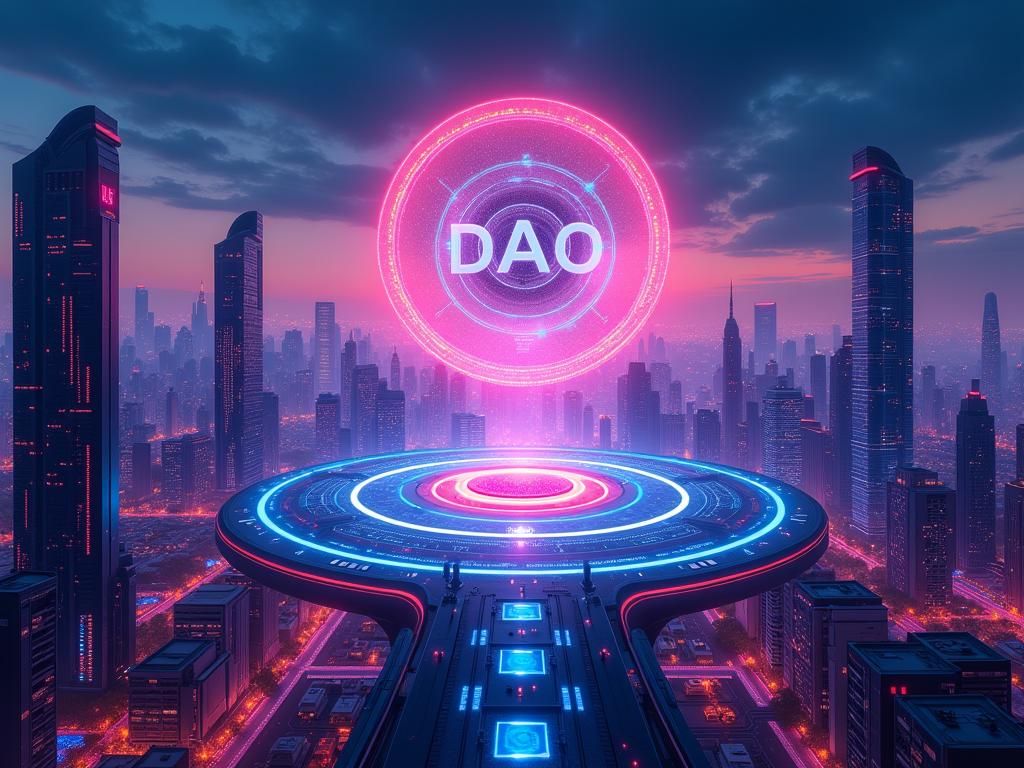Imagine a world where decentralized autonomous organizations (DAOs) can self-reconstitute, adapting to changing circumstances without human intervention. Welcome to the realm of AI powered DAOs, where artificial intelligence meets blockchain technology to create a new paradigm for decentralized governance.
Introduction to Self-Reconstituting DAOs
DAOs are organizations that operate on a blockchain network, allowing for decentralized decision-making and autonomous execution of rules. However, traditional DAOs are limited by their rigid structures and lack of adaptability. The integration of AI policy engines into DAOs has the potential to revolutionize the way these organizations operate, enabling them to self-reconstitute and evolve over time.
Self-reconstituting DAOs are designed to reorganize and adapt in response to changing conditions, such as shifts in market trends or changes in regulatory environments. This is achieved through the use of AI-powered policy engines, which analyze data and make decisions based on predetermined rules and objectives. By leveraging machine learning algorithms and natural language processing, AI policy engines can identify patterns and make predictions, allowing DAOs to anticipate and respond to potential challenges.
Key Benefits of Self-Reconstituting DAOs
The benefits of self-reconstituting DAOs are numerous, including:
- Improved adaptability: Self-reconstituting DAOs can respond quickly to changing circumstances, reducing the risk of obsolescence and increasing their chances of success.
- Enhanced decision-making: AI policy engines can analyze vast amounts of data and make decisions based on objective criteria, reducing the influence of personal biases and emotions.
- Increased efficiency: Automated decision-making processes can streamline operations, reducing the need for manual intervention and minimizing the risk of human error.
- Greater transparency: Self-reconstituting DAOs can provide real-time updates on their activities and decisions, promoting transparency and accountability.
For example, a self-reconstituting DAO focused on investing in cryptocurrencies like Bitcoin could use AI policy engines to analyze market trends and make decisions about when to buy or sell. This would allow the DAO to respond quickly to changes in the market, maximizing its returns and minimizing its losses.
The Role of AI Policy Engines
AI policy engines are the brain behind self-reconstituting DAOs, enabling them to analyze data, make decisions, and adapt to changing circumstances. These engines are powered by machine learning algorithms and natural language processing, allowing them to learn from experience and improve their decision-making over time.
AI policy engines can be used to analyze a wide range of data, including market trends, social media sentiment, and regulatory updates. By integrating with external data sources, such as CoinDesk or Bloomberg, AI policy engines can provide self-reconstituting DAOs with a comprehensive view of the market and enable them to make informed decisions.
Technical Requirements for Self-Reconstituting DAOs
The technical requirements for self-reconstituting DAOs are significant, requiring a combination of blockchain technology, AI policy engines, and external data sources. Some of the key technical requirements include:
- A blockchain platform that supports the creation and deployment of smart contracts, such as Ethereum or Hedera Hashgraph.
- An AI policy engine that can analyze data and make decisions based on predetermined rules and objectives, such as IBM Watson or Microsoft Azure Cognitive Services.
- External data sources that provide real-time updates on market trends, social media sentiment, and regulatory updates, such as Quandl or Sentieo.
By integrating these technical components, self-reconstituting DAOs can provide a robust and adaptable framework for decentralized governance, enabling them to respond quickly to changing circumstances and make informed decisions.
Challenges and Limitations
While self-reconstituting DAOs offer a promising solution for decentralized governance, there are several challenges and limitations that must be addressed. Some of the key challenges include:
- Regulatory uncertainty: The regulatory environment for self-reconstituting DAOs is still evolving, and there is a need for clearer guidelines and standards.
- Security risks: Self-reconstituting DAOs are vulnerable to security risks, such as hacking and data breaches, which can compromise their integrity and effectiveness.
- Scalability: Self-reconstituting DAOs require significant computational resources and data storage, which can be a challenge for large-scale deployments.
Despite these challenges, self-reconstituting DAOs have the potential to revolutionize the way we think about decentralized governance and decision-making. By leveraging AI policy engines and blockchain technology, these organizations can provide a robust and adaptable framework for responding to changing circumstances and making informed decisions.
Future Directions
The future of self-reconstituting DAOs is exciting and rapidly evolving. As the technology continues to mature, we can expect to see new applications and use cases emerge, such as:
- Decentralized finance (DeFi): Self-reconstituting DAOs can provide a robust and adaptable framework for DeFi applications, such as lending and borrowing platforms.
- Supply chain management: Self-reconstituting DAOs can be used to optimize supply chain management, enabling companies to respond quickly to changes in demand and supply.
- Healthcare: Self-reconstituting DAOs can be used to improve healthcare outcomes, enabling healthcare providers to respond quickly to changes in patient needs and medical research.
For more information on the latest developments in self-reconstituting DAOs and cryptocurrencies like Ethereum, please visit TokenRobotic.
In conclusion, self-reconstituting DAOs with AI policy engines have the potential to revolutionize the way we think about decentralized governance and decision-making. By leveraging blockchain technology, AI policy engines, and external data sources, these organizations can provide a robust and adaptable framework for responding to changing circumstances and making informed decisions. To learn more about the latest developments in self-reconstituting DAOs and Discover more on TokenRobotic, please visit TokenRobotic today.

